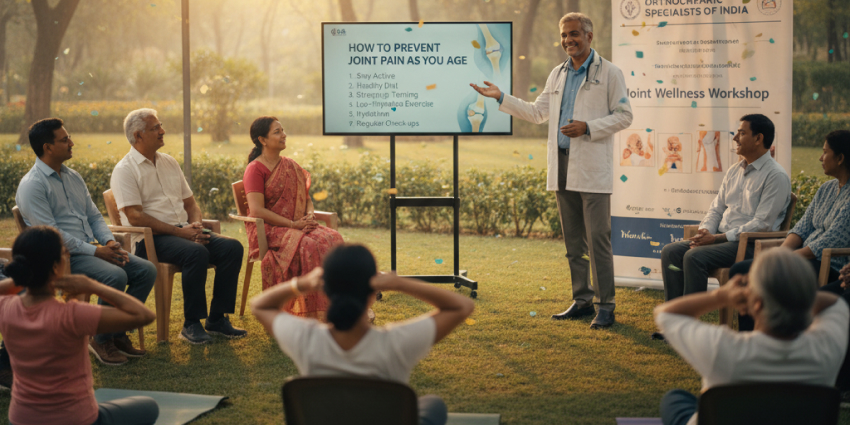Joint pain is a common issue as we age, often starting with mild stiffness or occasional discomfort, particularly in the knees, hips, and spine. While natural age-related changes in cartilage, bone density, and muscles contribute, pain is not inevitable. Learning how to prevent joint pain aging can help maintain mobility, independence, and overall quality of life.
At Venkateshwar Hospital, orthopaedic specialists offer early assessment, personalised guidance, and practical strategies, including exercise, weight management, and diet advice—to protect joint health and manage age-related changes effectively.
Why Joint Pain Increases With Age?
Several factors contribute to joint discomfort in older adults:
- Natural wear and tear: Cartilage gradually wears down, leading to conditions like osteoarthritis.
- Reduced flexibility and mobility: Muscles and ligaments become stiffer, limiting movement.
- Decreased bone density: Weaker bones increase the risk of joint strain and injury.
- Sedentary lifestyle impact: Less activity weakens muscles and affects joint stability.
- Hormonal changes: Postmenopausal women may experience faster bone and joint changes.
- Genetic Factors
- Inflammation of the body due to pollutants infection and drugs.
Maintain a Healthy Weight
Excess weight adds pressure on weight-bearing joints such as knees, hips, and the lower back. Managing weight is an effective way to prevent joint pain aging.
Benefits of a healthy weight:
- Reduces stress on joints
- Improves mobility and reduces discomfort
- Lowers the risk of developing osteoarthritis
- Reducing weight also decrease inflammation of the body.
Tips for weight management:
- Eat a balanced diet rich in fruits, vegetables, lean proteins, and whole grains
- Engage in regular physical activity appropriate to your ability
- Practise portion control to avoid overeating
Also Read – Arthritis vs Osteoporosis: Understanding the Key Differences
Stay Active with Low-Impact Exercises
Regular movement strengthens muscles around joints, improves flexibility, and prevents stiffness.
Recommended activities:
- Walking: Gentle yet effective for weight-bearing joints
- Swimming: Provides resistance without strain
- Cycling: Builds endurance and supports circulation
- Yoga & Tai Chi: Improve flexibility, posture, and balance
Tip: Always warm up before exercising and avoid overexertion. Staying consistent with movement helps prevent joint pain aging naturally.
Eat a Joint-Friendly Diet
Nutrition plays an important role in joint health by supporting bones and reducing inflammation.
Key nutrients:
- Calcium: Strengthens bones (found in milk, leafy greens, and fortified foods, as well as nuts, lobia, sesame seeds, almonds, guava, custard apple, and drumsticks).
- Vitamin D: Helps the body absorb calcium and maintain bone density
- Omega-3 fatty acids: Reduce inflammation (found in fish, walnuts, and flaxseed)
Foods to limit:
- Processed items
- Sugary beverages
- Excessive meat especially red meat
- Excessive salt
Practice Good Posture and Safe Lifting
Poor posture adds strain to joints, particularly the spine, hips, and knees.
Posture tips:
- Sit upright with feet flat on the floor
- Keep ears, shoulders, and hips aligned
Safe lifting:
- Bend your knees
- Keep your back straight
- Use your legs to lift, not your back
These practices contribute to long-term strategies to prevent joint pain aging.
Sunlight Exposure:
10-50 min sunlight exposure direct or indirect on whole body from 10 am – 3 pm (depending on skin type)
Also Read – Knee Pain Causes: When to Consider Seeing an Orthopaedic Surgeon
Listen to Your Body and Seek Professional Help
Ignoring joint discomfort can lead to long-term damage. Early attention ensures proper management and can help prevent joint pain aging from worsening.
When to consult an orthopaedic specialist:
- Persistent pain or swelling
- Difficulty performing daily activities
- Increasing stiffness over time
At Venkateshwar Hospital, orthopaedic specialists assess joint health, provide personalised care plans, and offer treatments such as physiotherapy, medication, or minimally invasive interventions tailored to each patient.
Other Expert-Recommended Tips
- Stay Hydrated: Supports joint lubrication and reduces stiffness
- Manage Stress: Helps control inflammation affecting joints
- Use Assistive Devices if Needed: Protects joints during daily movement
- Warm Up Before Exercise: Prepares muscles and joints for activity
Conclusion
While age-related changes in joints are natural, they do not have to define your quality of life. Maintaining a healthy weight, staying active with low-impact exercises, eating a joint-friendly diet, practising good posture, and consulting an orthopaedic specialist can effectively prevent joint pain aging. At Venkateshwar Hospital, patients receive expert guidance and personalised joint care plans to support long-term mobility and independence.
Frequently Asked Questions
1. Can joint pain be completely prevented in old age?
Not always, but adopting healthy habits can delay or reduce discomfort and help prevent joint pain aging.
2. How does diet affect joint health?
A diet rich in calcium, vitamin D, and omega-3 fatty acids supports bones and reduces inflammation.
- Should I take supplements to prevent joint pain?
Supplements like calcium, vitamin D, and fish oil may help if dietary intake is insufficient. Always consult your doctor first. - How often should seniors see an orthopaedic specialist?
Yearly check-ups are enough if there are no symptoms, but persistent pain requires earlier consultation. - Are there supplements that help with joint pain prevention?
Glucosamine, chondroitin, calcium, and vitamin D can be considered under medical supervision.
3. When should I see an orthopaedic specialist for joint pain?
If joint pain affects daily life, worsens, or comes with swelling and stiffness, consult an orthopaedic specialist promptly.
Medically Reviewed by — Dr. Vibhore Singhal (Director – Joint Replacement, Robotics & Orthopaedics)














